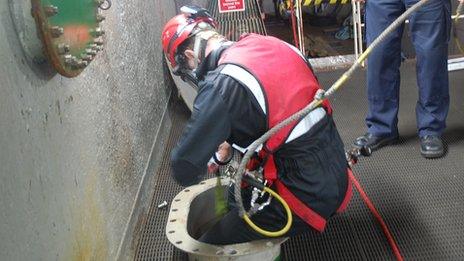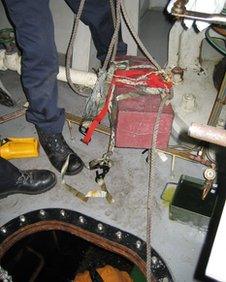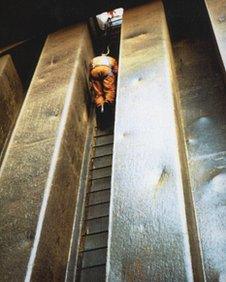Drug rummage team's 'hide and seek' work on ships
- Published

The rummage team inspects tanks and other confined spaces on board vessels
Specialist Border Force officers have given BBC News a rare insight into the high-stakes game of "hide-and-seek" they are involved in on a daily basis in the hunt for smuggled drugs aboard ships entering UK ports.
Thousands of commercial vessels from around the world enter UK waters every year, bringing a chance for international criminal gangs to surreptitiously move drugs over water and on to shore.
If illegal substances are being smuggled, it is the job of the National Deep Rummage Team (NDRT) to find where.
But vessels are vast structures with many hiding places - some are capable of carrying 14,000 containers, equal in length to a 44-mile long train.
Drugs could be concealed anywhere from under a cabin bed bunk to the harder to reach places like tanks filled with liquid or buried deep within the bulkhead.
Paul Tunney, the team's senior officer, said: "It's like a giant game of hide and seek but there's no-one to tell us if we're getting warmer.
"You've got to go on board with imagination and with the mindset that you are going to find something."
Working vessels are hostile environments and with it brings the risk of danger to rummagers.
They have to climb in and inspect tanks, crawl into the vessel's inner structure or scale the hull walls of the cargo holds.
Seizures worth £155m
Because of the specialised nature of their work, they also have to be trained in immediate life support first aid and self rescue, rather than rely on other emergency services.

The team recovered 21.5 kgs of cocaine in Holyhead from a vessel from Jamaica
"When we're on a vessel it is working, it is discharging and loading cargo so there are lots of things on the move," said Mr Tunney.
"If we're going into a confined space it needs to be aerated, there could be gases or a lack of oxygen in it.
"If we're going into a tank, we have to check the atmosphere of the tank and go in wearing breathing apparatus.
"People have died in accidents on vessels and we don't want that to happen to our officers."
As crucial as hunting out and searching the confined spaces is, the 'bread and butter' of rummage work is talking to those on board.
"We talk to the captain and crew, monitor their body language, see how they feel about us being on board and take all those factors into account," said Mr Tunney.
"There are clues, it's just recognising them. It may be that the captain says no-one has been in a particular area but you notice footprints or you see some new piece of construction.
"Vessels don't smuggle, it's people that smuggle."
The Border Force's NDRT formed in 2004. There are now four specialist teams based at Liverpool, Immingham, Felixstowe and Southampton.
Since its launch, the teams have found some 777 kilos of class A drugs with a street value of approximately £155m.
The teams are responding to an ever-changing shipping world.
Crew previously made their fortunes smuggling tea, silk and brandy into UK ports.
Now highly organised international crime groups are able to bring drugs, cigarettes and illegal immigrants into the UK.
Mr Tunney said: "Often we find people involved in smuggling are going on diving holidays thinking they can learn to dive and then collect drugs attached to the hull of vessels over here.
"Diving in water near ships is totally different to swimming in the Red Sea.
"It's an unforgiving environment and people can very quickly get disorientated."

Vessels searched by the teams range from 35 metres to 350 metres long
The team works closely with other maritime authorities, the police dive teams, the Serious Organised Crime Agency and other government departments.
Vessels are selected for searching by an intelligence-driven method, with those presenting the highest risk targeted.
Much of the team's success comes down to having access to the MV Altea - a ship that was impounded after being caught attempting to smuggle 17 tonnes of cannabis into the country in 1989.
It was agreed by the Treasury to let the rummaging team use it as their training facility and the vessel is now permanently moored in Liverpool Docks.
Mr Tunney said: "At the end of the day we're stopping illegal goods onto the streets of the UK, we're protecting our families and communities and that's where we get our buzz."
- Published14 August 2012
- Published7 November 2011
- Published7 January 2011